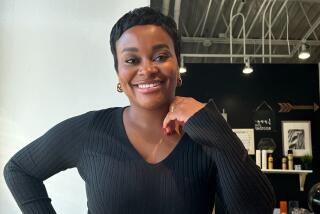PERSONAL HEALTH : Does Hair Treatment Affect the Unborn?
- Share via
Every day, obstetricians warn their patients not to use recreational drugs and to ask before taking any new medicine.
But what about the grayer area of hair treatments? To color or not? To curl, to straighten, to highlight?
It’s a tough call. Studies on the chemicals found in some hair care products--and their effects on the unborn--are just beginning. A Pittsburgh doctor has recently embarked on such a study.
Until more data is in, many obstetricians advise abstinence or moderation, especially during early pregnancy. There are also some common-sense measures to minimize chemical exposure.
*
What’s What: Hair care preparations include a variety of chemicals, according to John Corbett, a vice president and chemist at Clairol Inc. The active ingredient in permanent waves is ammonium thioglycolate, he says, while hair relaxers often contain sodium hydroxide. Hair color may contain aromatic amines and phenols. Bleaching typically involves the use of hydrogen peroxide.
*
Government Regulation: Hair treatment products are regulated by the Food and Drug Administration, says John Bailey, acting director of the FDA Office of Colors and Cosmetics. “Basically, manufacturers have to vouch for the safety of the product,” he says. Testing for toxicity during pregnancy, however, is “not a specified requirement,” he adds.
*
Industry Input: There is no scientific evidence to indicate any ill effect during pregnancy from hair color, permanents or relaxers, says Irene Malbin, a spokeswoman for the Cosmetic, Toiletry, and Fragrance Assn., a Washington, D.C.-based trade organization. More than a dozen animal studies investigating the effect of hair color, for instance, have found no adverse effects, she says.
Chemicals from hair products are absorbed through the scalp “in minute quantities,” says Corbett.
Still, the association advises pregnant women to consult their doctors for guidance “on any aspect of lifestyle during pregnancy,” Malbin adds.
*
Reaction to Industry Input: Some animal studies have found adverse effects from hair product ingredients, counters Dr. Karen Ann Filkins, director of reproductive genetics at West Penn Hospital, Pittsburgh, and a University of Pittsburgh associate professor of genetics, who has begun a study of hair treatments during pregnancy. But the quantities studied are much higher doses than those typically used by consumers, leading her to speculate that there would normally be no birth defect problems with use of the products.
She’ll know more after her study results are in. (There is no completion date yet.) So far, Filkins has collected data on about 100 women who have become pregnant after exposure to chemicals in hair treatments and hopes to study thousands.
*
Doctors’ Advice: This lack of human data--and the absence of an official stand on the issue by the American College of Obstetricians and Gynecologists--leaves many doctors erring on the side of caution. Avoid the use of permanents, hair colors and relaxers during pregnancy and especially during the first trimester, Filkins advises.
“If you can wait, wait,” agrees Dr. Sandi Leong, a Santa Monica obstetrician on staff at Santa Monica Hospital Medical Center.
But Filkins and Leong also advise women not to panic if they use hair treatments and then learn they are pregnant.
Moderation is next best to abstinence, Filkins says. Women can pick treatments that involve minimal contact of chemicals with the scalp, such as highlighting, thus avoiding absorption.
Pregnant hairdressers should take the same precautions as lab workers, Filkins says, wearing gloves when handling chemicals, avoiding contact with skin and working in a well-ventilated area.
*
Hairdresser Input: “First ask your obstetrician,” advises Francois Noel, a colorist at Cristophe Salon in Beverly Hills. “I usually suggest avoiding hair color during the first trimester,” he adds, but thinks the caution is probably overkill.
“Perm just the ends of the hair,” suggests Ben Ashikita, owner of Soshin, a Santa Monica hair salon.
*
Other Safeguards: “Pick the chair in the best ventilated area,” Filkins advises pregnant women undergoing hair treatments.
*
Hot-line Help: The California Teratogen Information Service, a state-funded service, operates from 9 a.m.-4:30 p.m. weekdays and can answer questions about hair product exposure. Call (800)-532-3749 or (619) 294-6084.






